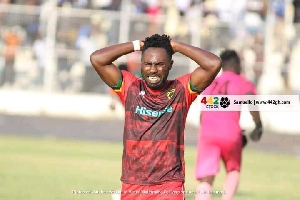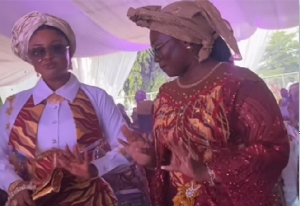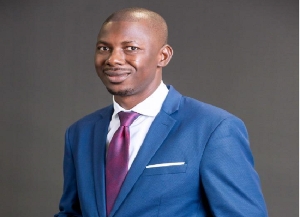- Home - News
- TWI News | TV
- Polls
- Year In Review
- News Archive
- Crime & Punishment
- Politics
- Regional
- Editorial
- Health
- Ghanaians Abroad
- Tabloid
- Africa
- Religion
- Election 2020
- Coronavirus
- News Videos | TV
- Photo Archives
- News Headlines
- Press Release
Regional News of Saturday, 11 December 2004
Source: GNA
Gomoa Assempanyin welcomes 318 million-cedi water project with joy
Gomoa Assempanyin (C/R), Dec. 11, GNA- Gomoa Assempanyin, a farming community in the Central Region, was at the weekend, gripped with joy during the commissioning of a 318 million cedis pipe-borne water facility, that ends the age-long water problem facing the over 2000 inhabitants.
Collaborators of the project joined the cheerful chiefs and people to dance in the scorching sun and heated laterite ground to highlife and gospel music provided by a local brass band, to commemorate the occasion.
The ecstatic community yelled when Mr Tim Donnay, Project Development Officer of the United States Agency for International Development, drank a cup of water from a water tank after cutting the tape to commission the project.
Mr Marlon Basel, US Peace Corps Volunteer and the brain behind the completion of the project that involved the connection of pipelines from Gomoa Brofo, which is 3.4 kilometres away, to tap water from the Kwanyaku Water Works into a 1000 gallon capacity tank, has been installed as the Nkosuohene (Development Chief) of the village in appreciation of his hard work.
The project, which was started by the Gomoa Assempanyin Initiative, a Community Based Organisation, a year ago, was completed with funds from a number of organisations that comprised the Peace Corps Programme in Ghana, 119. 8 million cedis and 85 million cedis from the Adventist Development and Relief Agency (ADRA).
Gomoa District Assembly committed 31.8 million cedis, Ms Ama Benyiwa Doe, Member of Parliament (MP) for the area, gave five million cedis through her share of the MP's Common Fund while the Ghana Water Company Limited offered 4.1 million cedis.
Nana Bentsiaku XIII, Adontenhene (Sub-chief) of Gomoa Akyepim Traditional Area, who chaired the function, said the project would give a new lease of life to the people who were formerly drinking from contaminated water sources, leading to guinea worm and other water borne diseases.
Mr Donnay said the project was a vision that was made possible through external support and other collaborative efforts. He announced plans by ADRA to provide about 350 water facilities to a number of rural communities.
Mr Samuel Asante-Mensah Country Director of ADRA said the pipe-borne project, was a departure from the boreholes provided by the Agency to rural communities.
Ms Madeleina Mader, Country Director of US Peace Corps, asked the community to cover the water they fetch from the tank, to prevent it from infection.
They must also endeavour to maintain the water system regularly. ADRA presented various citations to individuals and organisations that contributed towards the implementation of the project. 11 Dec. 04










